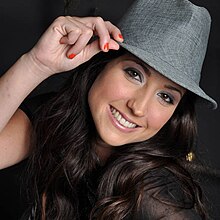Nina Fedoroff
Nina V. Fedoroff | |
|---|---|
 | |
| Born | April 9, 1942 |
| Nationality | American |
| Alma mater | |
| Scientific career | |
| Fields | Biology |
| Thesis | Purification and Properties of Bacteriophage f2 Replicase (1972) |
| Doctoral advisor | Norton Zinder |
Nina Vsevolod Fedoroff (born April 9, 1942) is an American molecular biologist known for her research in life sciences and biotechnology, especially transposable elements or jumping genes.[1] and plant stress response.[2][3] In 2007, President George W. Bush awarded her the National Medal of Science, she is also a member of the United States National Academy of Sciences, the American Academy of Arts and Sciences,[2] the European Academy of Sciences, and the American Academy of Microbiology.[4]
Early days
Fedoroff, whose father was an immigrant to the USA and her mother a first generation immigrant, was born in Cleveland, Ohio. Her first language was Russian.[5] When she was nine years old her family moved to Fayetteville, New York, a suburb of the city of Syracuse.
She then relocated to Philadelphia where she planned to study music but returned to study science at Syracuse University.[5] She graduated summa cum laude in 1966 from Syracuse University with a dual major in biology and chemistry.[6][7] She received her PhD in molecular biology 1972 from The Rockefeller University.[8]
Research career
After graduating from Rockefeller University in 1972[8] she joined the faculty of the University of California, Los Angeles, where she did research into nuclear RNA.[9] She moved in 1978[8] to the Carnegie Institution for Science in Baltimore, Maryland, worked on developmental biology at the Department of Embryology, where she pioneered DNA sequencing and worked out the nucleotide sequence of the first complete gene.[9] In 1978, she also joined the faculty of Johns Hopkins University Biology Department, where she worked on the molecular characterization of maize transposable elements or jumping genes, for which Barbara McClintock was awarded a Nobel Prize in 1983.[9]
학문적 지위
1995년 페도로프는 버네 M으로 펜실베이니아 주립 대학에 도착했다. 윌라만 생명과학부 교수는 현재 생명과학연구소로 알려진 이 기구를 설립하고 지휘했다.[10] 2002년, 그녀는 이 대학의 최고 학문적 영예인 에반 푸그 교수로 임명되었다.[8][11] 2013년 페데로프는 압둘라 왕 과학기술 대학(KAUST)의 저명한 초빙 교수로 산타페 연구소의 외부 교수진이었다.[12][4][9]
명예
1990년에는 시카고 대학에서 하워드 테일러 리케츠 상을 수상하였고, 1992년에는 뉴욕 과학 아카데미 우수 현대 여성 과학자상을 수상하였다.[10][10] 1997년에 Fedoroff는 John P를 받았다. 시그마자이로부터 받은 맥거번 과학 및 사회 훈장.[8] 2003년에 그녀는 시러큐스 대학의 조지 아렌츠 파이오니어 메달을 받았다.[8]
2001년 빌 클린턴 대통령은 페도르프를 국가과학재단을 총괄하는 국가과학위원회에 임명했다.[10] 과학상을 주관하지 페도르프는 콘돌리자 라이스, 힐러리 클린턴[6][13] 미 국무장관과 2007년부터 2010년까지 국제개발기구의 라지브 샤 행정관의 과학기술보좌관을 지냈다.[14] 2007년 조지 W 부시 대통령은 그녀에게 미국 내 과학 연구 분야에서 평생의 업적을 이룬 공로상 중 최고상인 생명과학 분야의 국가 과학 훈장을 수여했다.[10] Fedoroff는 2011년부터 2012년까지 미국과학진흥협회(AAAS) 회장을 역임했다.[15] 그녀는 미국 국립과학아카데미, 미국예술과학아카데미, [2]유럽과학아카데미, 미국미생물아카데미 회원이다.[4]
사생활
Fedoroff는 3명의 자녀와 7명의 손자가 있다. 그녀는 음악, 연극, 노래를 즐긴다.[3][5] 페도로프는 미혼모였고, 공부를 하고 생계를 꾸려나가면서 혼자 세 아이를 키울 수 있었다.[16]
Bibliography
Books
- Fedoroff, Nina (1992). The dynamic genome : Barbara McClintock's ideas in the Century of Genetics. Cold Spring Harbor Laboratory Press.
- Nina Fedoroff, Mendel in the Kitchen: A Scientist's View of Genetically Modified Foods, National Academy Press, 2004, ISBN 0-309-09205-1
- Nina Fedoroff, Plant Transposons and Genome Dynamics in Evolution, Barnes & Noble, Wiley, John & Sons, Incorporated, 2013, ISBN 9781118500101
Essays and reporting
- Fedoroff, Nina (Feb–Mar 2014). "Battle lines : will agriculture be a victim of its own success?". Special Feature. Food Wars. Cosmos. 55: 40–41.
See also
References
- ^ Dreifus, Claudia (18 August 2008) A Conversation with Nina V. Fedoroff The New York Times, Science section, Retrieved 14 may 2012
- ^ a b c Friedberg, E. C. (2008). "Nina Fedoroff". Nature Reviews Molecular Cell Biology. 9 (10): 744–745. doi:10.1038/nrm2511. PMID 18819172. S2CID 30721901.
- ^ a b Elder, Andy (Fall 2002) Faces of Penn State, 2002: Nina Fedoroff Pennsylvania State University, PennState Eberly College of Science, Retrieved 14 May 2012
- ^ a b c Fagan, Adam (22 February 2011) Plant Biologist Nina Fedoroff Assumes AAAS Presidency American Society of Plant Biologists, Press release, Retrieved 14 May 2012
- ^ a b c Nina Fedoroff, Class of 1960, Inducted in 2009 Archived 2011-07-24 at the Wayback Machine Fayette-Manlius Schools Hall of Distinction Inductees, Retrieved 2 March 2014
- ^ a b Winne Alvarez, Jaime (July 25, 2007). "SU alumna, new National Medal of Science recipient, named science and technology adviser to U.S. Secretary of State Condoleezza Rice". SU News. Retrieved 29 April 2021.
- ^ "Women in science and University Syracuse University - Nina Vsevolod Fedoroff". Syracuse University, Syracuse NY 13210. 2013. Retrieved 2013-07-07.
- ^ a b c d e f Staff, (18 July 2007) Biography Nina V. Fedoroff Special Adviser Science and Technology U.S. Department of State, Retrieved 30 June 2016
- ^ a b c d (2013) Santa Fe Institute - Nina Fedoroff Web page of the Santa Fe Institute, Retrieved 12 August 2013
- ^ a b c d e Staff, Fedoroff to Receive National Medal of Science Pennsylvania State University, PennState Eberly College of Science, 2007 News, Retrieved 14 May 2012
- ^ Staff, Nina Fedoroff; Willaman Professor of Life Sciences; Evan Pugh Professor, Department of Biology The Huck Institute of Life Sciences, Retrieved 14 May 2012
- ^ (2013)Nina Fedoroff: Director, Center for Desert Agriculture, Distinguished Professor, Bioscience Faculty of the King Abdullah University of Science and Technology, Retrieved 12 August 2013
- ^ Pincus, Erica (22 December 2014). "The Science and Technology Adviser to the U.S. Secretary of State". Science & Diplomacy. 3 (4).
- ^ Staff, Nina Fedoroff, Professor of Life Sciences, Pennsylvania State University The Economist Conferences 2012, Retrieved 14 May 2012
- ^ "Nina Fedoroff: 21st-Century Challenges Require Global Focus by Scientists". Science. 331 (6016): 422–425. 28 January 2011. Bibcode:2011Sci...331..422.. doi:10.1126/science.331.6016.422.
- ^ Dreifus, Claudia (2008-08-18). "Nina Fedoroff, Advocate for Science Diplomacy". The New York Times. ISSN 0362-4331. Retrieved 2017-09-15.


